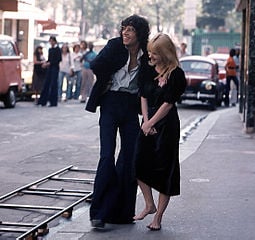They say it because it is demonstrably true. We have numbers for these things, no need to ask random people about it.
The pandemic caused justified rapid increases in food prices due to supply chain constraints. Once the supply chains stabilized, not only did the prices not return to normal, corporations continued to increase prices along the post-pandemic escalated inflation rate.
The last President to use an Executive Order to control grocery prices was Nixon, and it was a horrible mistake. Not only did it cause supply chain issues, as soon as the Order expired the prices increased well past the standard inflation rate.
What they are doing could be considered criminal profiteering, and should be prosecuted by the Department of Justice.
It wasn’t just the supply chain disruptions. It was also the forced closing of tons of small businesses leading to a lack of competition in the market.
That’s a very valid point. There were many small brand purchases during that time. In hindsight, they probably had no choice but to sell off and cut losses.
Yeah it’s strange that this is about a poll instead of data
Perceived inflation is not the same as actual inflation as measured by the official inflation basket. Quite often you have a situation where day to day goods are increasing in prices (and thus driving perceived inflation), while more permanent expensive but rarely bought goods (TVs, cars etc.) are dropping in prices, so that on average the official inflation rate isn’t increasing that much.
Do the other 20% just never go grocery shopping?!? I’m fortunate enough that food affordability isn’t an issue for me, but it would be very difficult not to notice that it’s significantly more expensive than it was pre-pandemic.
yeah, crazy headline, should be “20% of americans are completely oblivious to rising food costs”
Its one banana Micheal! How much could it possibly cost? $10?
I wouldn’t be surprised if 20% never go shopping considering how some marriages, young adults and old adults live their life very close to other more organised individuals
I guess the other 20% have someone else buy all their groceries for them
That was my first guess as well. People who are wealthy enough to both a) not be affected by it will generally be wealthy enough to not do their own shopping.
I was thinking more like people who live at home with their parents, and their parents buy the food. The top 20% of earners start at $80,000/year and those folks are certainly seeing the impact.
The top 20% of earners start at $80,000/year
Jeez…I knew it was bad. But I didn’t realize it was that bad.
I’m not questioning or anything. Just interested in knowing where you got that number from.
Sure thing, I was quoting this article: https://www.usatoday.com/money/blueprint/investing/are-you-upper-middle-class/
Bear in mind that’s individual income. If you’re looking at family income it’s around 130k (per the latest census data).
My household makes more than that and the grocery prices are still hitting us hard. Went from spending ~$150/month to spending almost that much per week. We’re not eating steaks or anything and we cook from scratch. It’s wild.
Could be folks that moved to an area where the prices are cheaper from when they came from. That has been the case for me.
It’s one banana, Michael.
Who the fuck are these other 20% of morons?
The rich fucks that it doesn’t apply to
Yup they don’t shop themselves and they certainly don’t even look at the prices.
I really don’t think 20% of Americans have personal shoppers.
Unless you count people whose spouse does all the grocery shopping and manages the finances - I could believe that’s a large enough chunk of the population to meaningfully contribute to the 20%
The top 20% would be around $110k or more per year, and there are definitely some parts of the country where $100k will be liveable, but you’ll still notice groceries prices going up.
some parts
Most parts.
So…these other 20%…they stupid?
Or do they just have so much ego and pride that they refuse to admit that they notice it, in fear of being thought of as “a poor”?
The other 20% only eat takeout.
Take out hasn’t hiked?
Just wondering, cause I can’t afford take out.
Takeout is same as restaurant prices. You’re probably thinking delivery.
I lied. I’ve done take out (rarely) & noticed price shifts there. Everywhere.
More “Ace” reporting by hurrdurr CNBC.
No shit grocery prices have gone up— and drastically.
The main issue with their reporting is that they completely fail to mention that the profits of the retail chains have also spiked and are the main “cause” of these price increases.
Agreed. Corporate profits and CEO pay are at all time highs while the struggling consumer continues to be gouged.
For me the main issue with their reporting is the sheer laziness. A lackadaisical survey of sentiment should not supplant actual data which is available to the lazy journalist @CNBC.
I view “reporting on the obvious” as being in the same vein as “a scientific report proving the obvious.” Sure we all know it’s true, but now there’s actually documentation you can point too.
I have managed a produce department for six years and watched it happen myself. The price increases aren’t being decided at the store level, though you’d be hard pressed to convince most crotchety old ladies that the managers don’t gather every week in crimson robes by candlelight and chant the latest price hikes. They are absolutely happening via the warehouses and the middlemen, though.
Everyone seeks to maintain or increase their margins, beginning with the farmers (who are likely adjusting for costs), and hiked greatly by the middlemen to make a larger profit. By the time the oranges are in the store’s hands, that 30% margin the store needs to maintain a profit is now calculated off a much higher number to begin with. All I can really do (and I’m lucky, as not every owner/operator allows this kind of autonomy) is shop around various third-parties and local businesses to try to secure the best price I possibly can, and in turn offer the best sale I possibly can at the store level. This gets a lot harder during the winter months, though.
As a shopper myself, however, I don’t really see this at many other stores. Especially those operating under corporate rules, like Sobeys, Safeway and Superstore. I sell apples at 1.69 to 1.99 /lb., while my competitors sell them at 2.49 to 2.99 /lb. year round. Why people continue to buy their produce there I couldn’t say.
Just realized today that my dog’s food has gone up almost $25 over the past three years
My cat eats a prescription food. A 7.7 pound bag has gone from $48 per bag to $60 per bag in the last 18 months.
That “notably increased” is putting it mildly. By my estimations, average prices are 50-100% higher than before the pandemic which is way higher than the official figure of around 20%. My shopping is without frills, just basic ingredients (fruits, vegetables, meats, grains, etc), minimal processing, and no brand names.
Boycott grocery stores, start buying from farmers markets
Every farmers market I have ever been to charges 2-4x the cost of the supermarket.
Removed by mod
My local farmer’s market is so expensive. I can’t afford that.
The local farmer’s market was found to be selling stuff they bought at the store but with a markup. I think we may actually have to go find some actual farms.
They’ve gone up in Canada too.
Thanks Weston’s, you’re all the greatest fuckheads alive.
Sorry
I couldn’t be sarcastic there, fuck em all with something hard and sandpapery














